Ayurveda Technician Course
advertisement
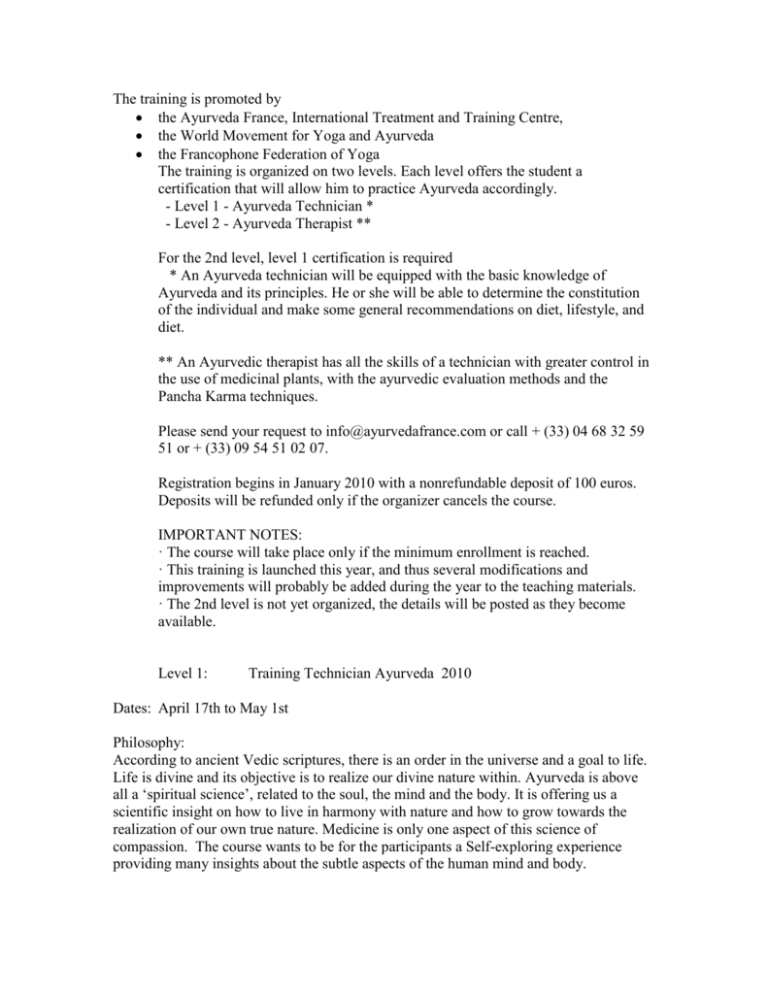
The training is promoted by the Ayurveda France, International Treatment and Training Centre, the World Movement for Yoga and Ayurveda the Francophone Federation of Yoga The training is organized on two levels. Each level offers the student a certification that will allow him to practice Ayurveda accordingly. - Level 1 - Ayurveda Technician * - Level 2 - Ayurveda Therapist ** For the 2nd level, level 1 certification is required * An Ayurveda technician will be equipped with the basic knowledge of Ayurveda and its principles. He or she will be able to determine the constitution of the individual and make some general recommendations on diet, lifestyle, and diet. ** An Ayurvedic therapist has all the skills of a technician with greater control in the use of medicinal plants, with the ayurvedic evaluation methods and the Pancha Karma techniques. Please send your request to info@ayurvedafrance.com or call + (33) 04 68 32 59 51 or + (33) 09 54 51 02 07. Registration begins in January 2010 with a nonrefundable deposit of 100 euros. Deposits will be refunded only if the organizer cancels the course. IMPORTANT NOTES: · The course will take place only if the minimum enrollment is reached. · This training is launched this year, and thus several modifications and improvements will probably be added during the year to the teaching materials. · The 2nd level is not yet organized, the details will be posted as they become available. Level 1: Training Technician Ayurveda 2010 Dates: April 17th to May 1st Philosophy: According to ancient Vedic scriptures, there is an order in the universe and a goal to life. Life is divine and its objective is to realize our divine nature within. Ayurveda is above all a ‘spiritual science’, related to the soul, the mind and the body. It is offering us a scientific insight on how to live in harmony with nature and how to grow towards the realization of our own true nature. Medicine is only one aspect of this science of compassion. The course wants to be for the participants a Self-exploring experience providing many insights about the subtle aspects of the human mind and body. Charaka Samhita stresses the importance of spiritual principles and sustains that it is not only perfect knowledge of Ayurveda that makes a good healer. According to him, a good practitioner is one who can "touch the soul or the inner self of the patient”. It is therefore the responsibility of the practitioner to inspire or awaken the patients to their own divine inner nature. When patients begin to experience their own divinity and feel that they are connected, healing becomes possible and therefore therapies, herbs, dietary changes, yoga therapy etc.. can be suggested. Content: The first level of this training aims to familiarize participants with the basic principles of Ayurveda practice that are intimately connected with the practice of Yoga. It will also provide the basis for other more advanced trainings and at the same time it will give the opportunity for students to be able to introduce some of the ayurvedic techniques such as massage & Shirodhara in their practice. This first level of the course will cover basic principles of Ayurveda practice · The doshas · The identification of the constitution · Food · Elements of anatomy · Vikriti or illness · Agni · Ama · Gradual reduction of the doshas. · Subtle methods of healing (by touching meditation, pranayama, asanas) It also review some spiritual principles and aims to a greater understanding of the human nature in its complexity. The study of certain subjects is important in understanding the suffering and the illness: · Samkhya theory · Karma · Samskaras · Spirit: manas, buddhi, chitta, · The 5 Koshas and the 3 bodies · The Chakras The course includes periods of practice, question and answer periods, yoga practice (meditation, ceremony) and case analysis. Students will need extra hours for reading, individual study and group work. Dates: The course will be given twice in 2010 April 17th May 1th 2010 and Oct 2nd – Oct 16th 2010 Address: The Livinière - 16 Street of the old furnace, 34210 Teachers: Maestro Amadio Bianchi, Swami Suryananda, President of the Global Movement of Yoga and Ayurveda, http://www.cysurya.milano.it/surya_eng/index_eng.html Suzana Panasian, Ayurveda therapist, teacher of Hatha and Raja Yoga, http://www.ayurvedafrance.com Books required for the course: · Techniques of Ayurveda to your daily well-being: Its effects on the body and mind, Indrajit Garai · Yoga and Ayurveda: Self Healing and Self Realization by David Frawley and Girija Smith-Dulac · Ayurveda, life is a balance: The Complete Guide to Nutrition and Ayurvedic body types, recipes ayurvedic Maya Tiwari · Perfect Health by Deepak Chopra, Kiran Vyas, and Alain-René Gelineau · Health through Ayurveda: A Practical Guide for Ayurvedic Therapies by David Frawley and Girija Smith-Dulac AYURVEDA TECHNICIAN COURSE PROGRAM 1: COSMOLOGY AND PHILOSOPHY OF AYURVEDA - 15 pm • The Spiritual Principles of Ayurveda and Yoga, the Vedas • What is Ayurveda, short history • Cosmology: Samkhya - the system of enumeration of Kapila • The three gunas or qualities of matter, Prakriti • The spiritual principles of Ayurveda • Karma 2: The doshas AND THE CONSTITUTION - 15 pm • The 20 attributes or qualities of matter, the 5 elements • The doshas, the elements, qualities, actions, locations and condition worsened • The factors that aggravate the doshas • The Doshas and the stages of the life, times of day, season and climate; • Prakriti and vikriti • The 7 types of constitution: constitutional analysis, the seven types of constitution • Time to practice the analysis of the constitution • The psychology of vata, pitta and kapha doshas and the emotions; • Emotions 3: ANATOMY & EVALUATION OF THE DISEASE (1) - 15 pm • The Subdoshas; the 5 types of Vata, Pitta and Kapha, functions and use; The state of imbalance subdoshas • The 7 tissues, interrelations, the statements of surplus and deficit • The body's organs, tissues and systems. • Agni, the principle of transformation • Ama, material undigested · Evaluation of the disease (1): the aggravation of the doshas, Sama &Niram conditions · Vikriti Analysis 4: NUTRITION + herbology (1) - 15 pm • Classification of foods • Food Study 1: Fruits and Vegetables • Food Study 2: cereals, seeds, beans and nuts. The dairy products and animal products • Food Study 3: Oils, condiments and spices. The diet for the three doshas; diet sattvic • Medicinal plants the most important: using the principles and regulations • The Samskara 5: SUBTLE METHODS OF HEALING - 15 pm • Yoga, Ayurveda, Yoga therapy, Yoga therapy Ayurvedic true dimentions of these disciplines • The three aspects of mind: chitta, buddhi, manas • Additional methods of reducing doshas (skin, respiration, senses, emotions, thoughts) • Subtle methods of healing aromatherapy and color therapy • Pranayama and Prana healing • The mantras and meditation in preparation Ayurveda • Asanas Ayurveda in perspective 6: - PROGRESSIVE METHODS OF REDUCING Dosh - 15h • The Kosha, the three bodies and the 7 chakras • Care progressive reduction of Vata, Pitta and Kapha 7: PROCEDURES - 70 pm • Presentation: Gunas & doshas, training and the memory of body tissue • Shirodhara - theory and practice
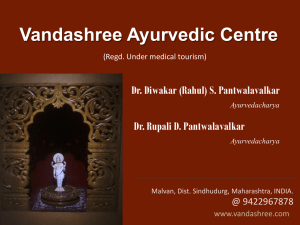
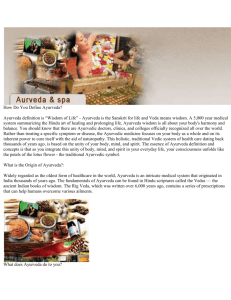
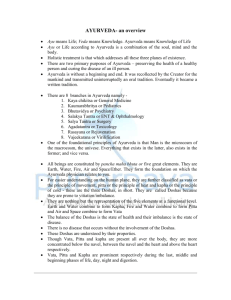
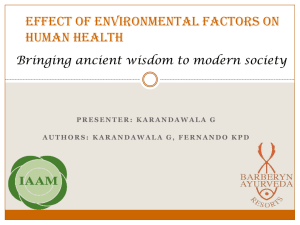
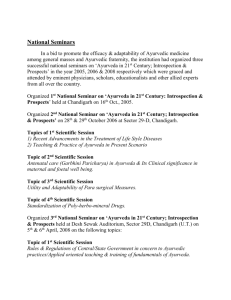
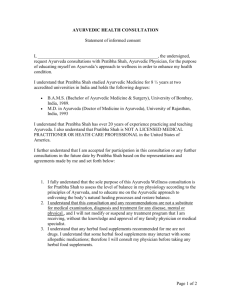
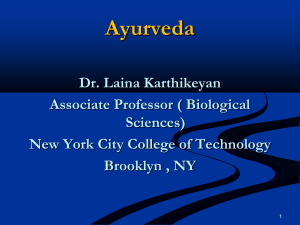

![Ayurveda derives from the Sanskrit ayus [longevity of life] and veda](http://s3.studylib.net/store/data/008060605_1-18bc45566da5cc950f6c0b9d77ce40d2-300x300.png)